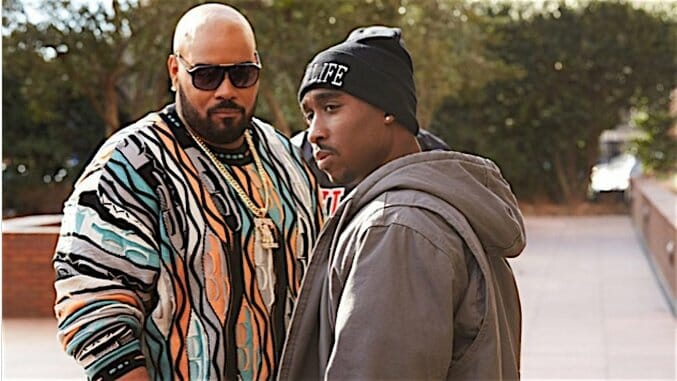All Eyez on Me

Biopics go about their work in one of three ways: Either they offer a sweeping overview of an influential or iconic person’s life, zoom in on a crucial or defining period from that life, or throw conventionality out the window for an experimental or impressionistic portrait that honors the individual’s spirit or magnitude. In recent years, several fine biopics have incorporated the latter two strategies, whether it be Lincoln’s examination of our greatest president at his most trying moment or I’m Not There’s intuitive, playful scrambling of Bob Dylan’s different personae into separate characters. Unfortunately, All Eyez on Me mostly serves as a warning for why the first approach simply isn’t as interesting or illuminating. Running more than two hours, this highlight reel of Tupac Shakur’s brief, brilliant life seemingly goes on forever and tells us precious little about the man it’s supposed to be chronicling.
The rapper, who died in 1996 at the age of 25, has been exhaustively eulogized, whether through his string of posthumous albums or a series of documentaries celebrating his cultural importance. With All Eyez on Me, director Benny Boom (Next Day Air) wants to give scope and grandeur to Shakur’s tragedy—how a talented young man was struck down in the prime of his life by the dark forces he documented in verse—but his film lacks the insight or bravado to pull off such a task. All Eyez on Me is far less innovative, electric and charismatic than its subject.
Relative newcomer Demetrius Shipp Jr. plays the adult Shakur, and he certainly looks the part, embodying the artist’s steely swagger while flashing the same soulful eyes. All Eyez on Me is constructed as a series of flashbacks from the perspective of 1995 as Shakur is in prison answering a journalist’s (Hill Harper) questions about how he got there. As we see pivotal moments in the young man’s journey as he moves from Baltimore to New York to Oakland, the movie eventually catches up to Shakur’s incarcerated present, abandoning the interview framework so we can see in detail the final year of his life after he gets out of prison.
-

-

-

-

-

-

-

-

-

-

-

-

-

-

-

-

-

-

-

-

-

-

-

-

-

-

-

-

-

-

-

-

-

-

-

-

-

-

-

-








































